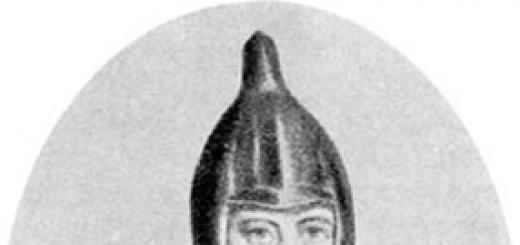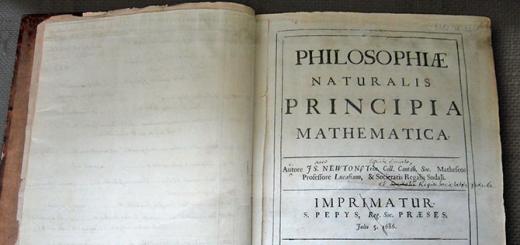Ippolit Fedorovich Bogdanovich (1743-1803) entered the history of Russian literature as the author of the heroic-comic fairy tale poem "Darling". Written in 1775. (first part), the poem was published in full in 1783. "Darling" with its irony in relation to mythological heroes and plots marked the ideological and aesthetic crisis of classicism. The content of "Darling" is ancient myth of the love of Cupid and Psyche, which received literary processing in the novel of the Roman writer Apuleius "The Golden Ass" (II century AD), and then in the XVII century. Lafontaine ("Love of Psyche and Cupid"). Bogdanovich Russified the foreign plot. It retains all the main features of the myth. The rewriting of this story is contained in the very tone, in a playfully ironic manner of presentation. This is how the images of ancient mythology are depicted, they are whimsically mixed with the characters of Russian fairy tales. In "Darling" there is no defiantly deliberate rudeness, but the author's irony and skepticism dominate everything, sparing neither gods nor people, and even the heroine of the poem herself, with all the poet's patronizing and affectionate attitude towards her. The poem richly includes elements of Russian fairy-tale folklore, intertwined with ancient Greek mythology. For example, the sword with which Hercules “cut off nine heads from the hydra” is kept in Kashchei’s “arsenal” and is called Samosek.
Darling herself lost the features of the ancient Psyche. The heroine of Bogdanovich is lively, flirtatious and capricious. The author portrays her with slight irony. She is characterized by traditionally feminine flaws: love of clothes, vanity, curiosity, gullibility (you might think that men do not suffer from vanity, I also ... female flaws) .
In "Darling" there is neither the philosophical depth of ancient myth, nor the wise immediacy of Russian folk tales. The poem does not fit within the framework of the poetics of classicism, being a symptom of the imminent literary shifts that formed in the depths of the classicism of the new literature. direction - Russian noble sentimentalism.
Neither Achilles' wrath nor the siege of Troy,
Where in the noise of eternal quarrels the heroes ended their days,
But I sing Dushenka.
Bogdanovich gives "Darling" a new genre designation "an ancient story".
The poem is written in a free, multi-foot iambic, with a free and varied rhyme. In general, we can say that this is the first representative poem of light poetry, a family love story in verse.
To make you understand what this nonsense is:
“I, Darling… love Cupid…”
Then she cried like a fool;
Then, without distant words with her,
The fisherman cried together
And her whole nature sobbed with her.
Summary of "Darling":
Once upon a time there was a girl, Dushenka, and she was so beautiful that she angered Venus with her beauty. Then Venus went to Cupid and, having collected "lies and all sorts of fables," she began to tell him all sorts of heresy about Darling. And Venus Amur asked to “Make a hateful darling forever”, in short, so that suitors would not go to her and that no one would dare to take her as a wife. And so it happened. Darling suffered and decided to leave home. She staggered around, and then ... "Invisible Zephyr on" windy wings "transfers Darling to luxurious halls." At night, the enamored Cupid comes to the girl, but does not allow her to see herself. And then the curious Dushenka, envious of her two evil sisters, whom Zephyr brings at her request to the Amur Palace, incite to see if her terrible husband is a snake, and if so, kill him; why the Zephyrs bring Dushenka to the palace the Self-cut Sword and an oil lamp; at night, Darling lights a lamp and examines her husband, admiring what a wonderful husband she has, but accidentally spills hot oil from the lamp on Cupid, and he wakes up, sees a sword at his wife’s feet, and becomes angry. And she was severely punished - the Zephyrs brought her back ("from the mountainous places to the earth, to where they took her from"). And then the suffering of the curious began. She tried to commit suicide, many times even. But Cupid did not forget her, and secretly followed her, and saved her. First, she jumped from the mountains, Zephyr caught her. Then "I'll cut myself! - she screamed; but she didn’t have a dagger, ”then she wanted to stab herself with stones, and, as luck would have it, they turned into bread. Hung on trees, but all bitches and ( With at ki!) bowed her to the ground. Further: "Couldn't cling to the oak, she decided to drown herself." But having jumped, she got on a pike and she rolled her over the waves. And finally, the last way to the desired suicide is to burn in the fire. I found some kind of fire in the forest, went into it, and it immediately went out. In the same forest, she meets a fisherman (when she cries like a fool - see above), who tells her why everyone hates her so much. And then the curious goes to Venus to beg for forgiveness. She sends her to all sorts of different feats, where Darling loses her beauty. In short, Cupid stands up for her, because he loves the soul of Darling, and everything ends well. Beauty returns, Darling and Cupid live happily ever after and their daughter is born. End of fairy tale.
The central, best work of Bogdanovich, which brought him fame, was Darling. It was created at a time when Bogdanovich had not yet finally become an "overcoat" poet, but when his departure from the progressive views and aspirations of his youth had already begun. Bogdanovich wrote it in the middle, or rather, in the second half of the 1770s. The first "book" of the poem was published in 1778 (with the title "Dushenka's Adventures"); one must think that the rest of the poem was not yet ready. The entire poem was published only in 1783 (Bogdanovich made stylistic corrections of the text of the poem and in its subsequent editions - 1794 and 1799). The transitional state of Bogdanovich's creativity left its mark on his poem.
"Darling" grew up on the basis of the stylistic tradition of the Kheraskov school; it owes a lot to the style of the fable (the very verse of the poem, the variegated iambic, connected it with the fable), and to the experience of lightly telling stories in Kheraskov's verse, and partly to the heroic comic poem. The free speech of the narrator fits into the usual formulas developed by the poetry of the Kheraskov school. But the poetic system, perceived by Bogdanovich from an early age, in his poem begins to be rebuilt, to serve other ideological and aesthetic tasks.
"Darling", like heroic-comic poems, reduces the kings, gods and heroes of the ancient world, but it is not "rude", it does not have the peculiar realism of "Eliseus", there is no "low" nature, there are no male coachmen. Bogdanovich strives in Darling for the elegance of salon playfulness, just as he strives for the pastoral sophistication of court ballet in his love lyrics (songs, idylls). The very eroticism of his poem is different than in Elisha - not the full-blooded semi-Barkovism of Elisha, but the frivolity of salon flirting.
"Darling", like Maikov's poem, despite its mythological plot, is not devoid of polemical attacks of a literary nature and, in general, elements of topicality that violate its antique scenery. But Bogdanovich wants to be "apolitical" in his poem, i.e. refrains from social and political criticism and teaching. Motifs of high-society modernity are woven into the outline of the story about the ancient Greeks. Bogdanovich inconspicuously turns Greek characters into nobles or kings of his era, and their environment is replaced by the environment of the St. Petersburg or Tsarskoye Selo palace festival. The description of the enchanted palace of Amur becomes a glorification of the palaces and parks of the Russian autocrat. The ancient myth is not given seriously, but in a travesty form, in the tones of a harmless joke of a ladies' man and a flatterer. The entire apparatus of images and mythology of Bogdanovich is associated with ideas about ballets, holidays, painting and sculpture that adorned the palace.
The heroine of the poem herself often becomes similar to a complimentary portrait of Catherine II (see, for example, the description of the portrait of Dushenka in Book II, which resembles the famous portrait of Catherine on horseback). Bogdanovich includes in the poem both a complimentary allusion to the Moscow masquerade of 1763 "Triumphant Minerva" and an allusion to the organization of the "Meeting trying to translate foreign books" at Catherine's expense. Darling began to read:
…translations
famous creators;
But often she did not understand them,
And for that she ordered
Correct syllable again Cupids
translate,
So that they can be without burden
read.
Zephyrs, finally, were brought to the princess
Various sheets that are brought to light
From the most ancient years
Between useful presumptuous
went out
And they threatened with bales
Pull hard Helikon.
Princess, knowing who was unknown
I didn’t violate the freedoms of the leaf-scribers,
But I haven't read their work.
In such a mockingly playful tone, Bogdanovich speaks (in the last verses of the quoted passage) about the struggle between progressive journalism and official journalism in 1769-1773. The “various leaflets” that “came out insolently” were, of course, Novikov’s satirical leaflets, etc., while the “useful” leaflets that came out at the same time were, of course, “All sorts of things.”
The salon style of "Darling" completely absorbs the thought that underlay the ancient myth of Cupid and Psyche, about the love of the soul (???? - in Greek - soul; hence the name of Bogdanovich's heroine). Bogdanovich followed in his poem the presentation not of Apuleius in his "Golden Ass", but of Lafontaine's novel "The Love of Psyche and Cupid" (1669), written in prose with poetic inserts. But Lafontaine, striving for the utmost simplicity of the story, set out to recreate the spirit of antiquity, as he understood it. Bogdanovich is not interested in either antiquity or myth per se. He writes an elegant fairy tale, and his task is to take the reader away from big and serious problems into the bright, cheerful world of jokes, light feelings, harmless sorrows, pink light. Therefore, his entire poem from beginning to end is playful, ironic. He overthrows all ideological idols with his grin. He laughs at people and gods, at love and suffering, at Venus and sometimes even at Darling herself. At the same time, his laughter is not the satirical laughter of a negative consciousness; it is a calm and indifferent laugh. Bogdanovich no longer believes in any ideals: he believes only in laughter, in the possibility of forgetting, in the fact that it is possible to fill the abyss in the soul with aesthetics, to replace real life with a smile, posture and admiring fictions.
Here, for example, the king, the father of Dushenka, in deep grief parted with his daughter, whom he was forced to leave on a mysterious mountain as prey to an unknown monster:
And finally, the king, bent into a hook with grief,
It was forcibly torn from the daughter's hands.
Mythological deities are depicted just as easily and jokingly, for example, Cupids serve Darling:
Another was in kravchih, the other wore dishes,
Another tired, and everyone popped everywhere;
And he considered himself a great honor,
To whom from the hands of their brownies their goddess
Half a glass of nectar deigned to bring.
And many stood before her with open mouths:
Though the Cupids are
In truth, they were by no means revered as greedy,
And more than wine
The princesses enjoyed their sight at that time.
Quite amusingly, the poem tells how Dushenka, expelled from Cupid's palace, decided to commit suicide, but unsuccessfully, since the caring deity removed all types of death from her. Finally, Dushenka was met by an old fisherman:
But who are you old man, he asked.
“I am Darling… I love Cupid…”
Then she cried like a fool
Then, without distant words with her,
The angler cried together
And all of Nature sobbed with her.
So the very tears amuse Bogdanovich.
Bogdanovich followed a different path than Muravyov, but he essentially arrived at the same point; Muravyov said that the sweet beauties of art are "what God created to adorn the empty universe." Bogdanovich is engaged in this decoration; and it doesn’t matter to him whether to compliment Catherine or not. For him, his poem is only a fairy tale, a game of a devastated mind, “an easy game of imagination,” as Karamzin defined Darling, and all the images of a fairy tale are indifferent to him, equally fictitious, equally illusory.
Therefore, Bogdanovich recalls the morality of his tale, the meaning of its plot only when the time has come to finish it; That is why he is so little occupied with the plot of the myth and devotes most of all space and art to descriptions of the charming dreamy world of a fairy tale, blissful gardens, etc. Therefore, although he sometimes follows Lafontaine's exposition quite closely, he creates an original work, because style, details, tone are all his own, and in style, details and tone the whole point of the poem as an expression of decadent aestheticism. The reader, who at that time already had in his hands in the Russian translation both the novel of Apuleius (translated by E.I. Kostrov, 1780), and the novel by Lafontaine (translated by F. Dmitriev-Mamonov, 1769), could easily see the very difference in the interpretation of a single plot in all three writers.
Thus, Bogdanovich's desire for grace and lightness at all costs, his aestheticism were a manifestation of a deep crisis of noble self-awareness and literature. At the same time, in Darling, Bogdanovich did not sink into that swamp of vulgarity into which his official connections and successes later dragged him. In this masterpiece of his, he was still a master of verse, whose art grew on the basis of a tradition that came from Sumarokov through the work of Kheraskov and his entire school. Along with “Rossiada” and “Darling”, in terms of skill, style and verse, this school was the ultimate achievement, and Bogdanovich uses all the experience of his teachers accumulated over a quarter of a century in a specific direction - precisely in order to create easy, free poetic speech. Freeing his art from the tasks of active social struggle, he focuses on solving the problems of the expressive flexibility of the language, maintaining a chamber, intimate-conversational tone throughout the poem, not rising to the grandeur of the Rossiada and not sinking to the "common" rudeness of Sumarokov's fables. This "medium", smoothed, somewhat cutesy language of poetry, first developed in a large form by Bogdanovich, played a large role in the history of Russian verbal art. He had a considerable influence on Karamzin and Dmitriev, he prepared the "light" poetry of the beginning of the 19th century, right up to Batyushkov, who not without reason highly appreciated Darling.
Bogdanovich taught Russian poets to convey in verse very subtle shades of the theme, to create elegant pattern-pictures, not real, but not alien to emotional charm. The straightforward clarity of Sumarokov's analysis gives way in Darling to the creation of a general synthetic representation, not "reasonable", but striving to influence fantasy. Bogdanovich creates in "Darling" a special language of poetry, poetry, aesthetic self-gratification, the language of "pleasure"; that is why he has such frequent words like "charming", "gentle", "secretly", "favorable", "sweet"; that is why he is looking for a harmonious, balanced phrase with an elegant finish. All this ephemeral element of poetic grace has nothing to do with the full-blooded element of folk art. Bogdanovich does not aspire, when creating a fairy tale, to write a Russian fairy tale. But he uses some Russian motifs, if he needs them, as material to be included in the cosmopolitan fabric of the "light" poetry of refined salon intellectuals. Therefore, in "Darling" there is both "The Serpent Gorynich" and Kashchei, however, they are not in the least like real fairy tales - and they stand next to Apollo, Diana, Paris; there is also a sundress in it next to marble statues, a chariot, an oracle, fragrant soaps, etc. For Bogdanovich, and Kashchei, and Apollo, and the oracle, and the sundress, and the fairy tale, and the myth, and the parody of the clerk's protocol, and the joke, and the words of love - everything in the world has lost its true meaning: for him there is only a dream of beauty, oh light fantasies, saving from reality.
Belinsky wrote in "Literary Dreams" about "Darling":
“The imitators of Lomonosov, Derzhavin and Kheraskov stunned everyone with a loud overpowering; they were already beginning to think that the Russian language was not capable of the so-called light poetry that flourished so much among the French, and at that time a man appeared with a fairy tale, written in simple, natural and playful language, the style, according to those times, surprisingly light and smooth; everyone was amazed and delighted. This is the reason for the extraordinary success of Darling, which, however, is not without merit, not without talent. However, already in the article “Russian Literature in 1841”, Belinsky called “Darling” “heavy and clumsy”, and even earlier, in a note about “Darling” (1841), he wrote: “What is really this glorified , this notorious "Darling"? “Yes, nothing, absolutely nothing: a fairy tale written in heavy verse ... devoid of any poetry, completely alien to playfulness, grace, wit.”
Olga Semyonovna Plemyannikova, the daughter of a retired collegiate assessor, enjoys universal sympathy: others are attracted by the good nature and naivety radiated by a quiet, rosy-cheeked young lady. Many acquaintances call her nothing more than "darling".
Olga Semyonovna has a constant need to love someone. Ivan Petrovich Kukin, an entrepreneur and owner of the Tivoli Pleasure Garden, becomes her next affection. Due to constant rains, the audience does not attend performances, and Kukin suffers continuous losses, which causes compassion in Olenka, and then love for Ivan Petrovich, despite the fact that he is small, skinny and speaks in a liquid tenor.
After the wedding, Olenka gets a job with her husband in the theater. She tells her acquaintances that this is the only place where one can become educated and humane, but an ignorant public needs a farce.
In Lent, Kukin leaves for Moscow to recruit a troupe, and soon Olenka receives a telegram with the following content: “Ivan Petrovich died today, suddenly waiting for orders, funeral Tuesday.”
Olga Semyonovna is very much worried about his death and wears deep mourning. Three months later, having passionately fallen in love with Vasily Andreevich Pustovalov, Olenka marries again. Pustovalov manages the timber warehouse of the merchant Babakaev, and Olenka works in his office, writing out invoices and releasing goods. It seems to her that the forest is the most important and necessary thing in life, and that she has been selling timber for a long time. Olenka shares all the thoughts of her husband and sits at home with him on holidays. To the advice of friends to go to the theater or to the circus, she sedately replies that working people are not up to trifles, and there is nothing good in theaters.
Olga Semyonovna lives very well with her husband; whenever Pustovalov leaves for the Mogilev province for the forest, she misses and cries, finding solace in conversations with the veterinarian Smirnin, her lodger. Smirnin broke up with his wife, having convicted her of treason, and every month he sends forty rubles to support his son. Olenka feels sorry for Smirnin, she advises the veterinarian to reconcile with his wife for the sake of the boy. After six years of a happy marriage, Pustovalov dies, and Olenka is left alone again. She only goes to church or to her husband's grave. Reclusion lasts six months, and then Olenka converges with a veterinarian. In the morning they drink tea together in the garden and Smirnin reads the newspaper aloud. And Olenka, having met a familiar lady at the post office, speaks about the lack of proper veterinary supervision in the city.
Happiness does not last long: the regiment in which the veterinarian serves is transferred almost to Siberia, and Olenka is left completely alone.
Years go by. Olenka is getting old; Friends lose interest in her. She does not think about anything and she no longer has any opinions. Among the thoughts and in the heart of Olenka is the same emptiness as in the yard. She dreams of love that would take over her whole being and give her thoughts.
Unexpectedly, the veterinarian Smirnin returns to Olenka. He reconciled with his wife, retired and decided to stay in the city, especially since the time had come to send his son Sasha to the gymnasium.
With the arrival of Smirnin's family, Olenka comes to life again. The veterinarian's wife soon leaves for her sister in Kharkov, Smirnin himself is constantly away, and Olenka takes Sasha to his wing. Maternal feelings awaken in her, and the boy becomes Olenka's new affection. She tells everyone she knows about the advantages of a classical education over a real one and about how difficult it has become to study at a gymnasium.
Olenka blossomed again and rejuvenated; acquaintances, meeting her on the street, experience, as before, pleasure and call Olga Semyonovna darling.
Ippolit Fedorovich Bogdanovich
"Darling"
In ancient Greece, in the time of Jupiter, when the “powerful tribe” multiplied so that each city has its own special king, one monarch nevertheless stands out from the rest in wealth, good looks and kindness, and most of all in that he has three most beautiful daughters. But the youngest daughter, with her appearance, nevertheless overshadows the beauty of the rest. The Greeks called this beauty Psyche, which means "soul"; Russian narrators call her Dushenka.
The glory of the younger princess spreads everywhere, and now “the cathedral of merriment, laughter, games”, cupids and marshmallows leave Venus and run away to Dushenka. No one else brings sacrifices or incense to the goddess of love. Soon, the wicked spirits inform the goddess that Darling has appropriated the servants of Venus, and, although the princess did not even think of angering the gods, they add that she did this to annoy Venus. Believing their lies, the angry goddess immediately flies to her son Amur and begs him to stand up for her desecrated honor, to make Darling ugly so that everyone turns away from her, or to give her a husband, worse than whom there is in the world.
Cupid, in order to calm his mother, promises to take revenge on the princess. And soon the news comes to Venus that Darling has been abandoned by everyone; former admirers do not even come close to her, but only bow from afar. Such a miracle troubles the minds of the Greeks. Everyone is lost in conjecture ... Finally, Venus announces to all Greece what the gods are angry about, and promises terrible troubles if Darling is not brought to her. But the king and all relatives unanimously refuse the goddess.
Meanwhile, Darling, in tears, appeals to Cupid: why is she alone, without a husband, even without a boyfriend? Relatives everywhere are looking for suitors for her, but, fearing the wrath of the gods, no one wants to marry the princess. In the end, it was decided to turn to the Oracle, and the Oracle replies that the spouse appointed by the fates for Darling is a monster that stings everyone, tearing hearts and carrying a quiver of terrible arrows behind his shoulders, and in order for the girl to unite with him, you need to take her to the top of the mountain, where hitherto no one used to go and leave there.
Such an answer plunges everyone into sorrow. It is a pity to give the girl to some monster, and all relatives declare that it is better to endure persecution and attack than to take Darling to be sacrificed, especially since it is not even known where. But the princess, out of generosity (or because she wants to have a husband, no matter what kind), she herself says to her father: “I must save you with my misfortune.” And where to go, Darling decides simply: the horses harnessed to the carriage must be allowed without a coachman, and let fate itself lead it.
A few weeks later, the horses themselves stop at some mountain and do not want to go further. Then Darling is led to a height without a road, past abysses and caves, where some evil creatures roar. And at the top, the king and his entire court, having said goodbye to the girl, leave her alone and, heartbroken, leave.
However, Darling does not stay there for long. The invisible Zephyr picks her up and lifts her to the "unknown village of heaven." The princess finds herself in magnificent palaces, where nymphs, cupids and marshmallows fulfill all her desires. At night, her husband comes to Darling, but since he appears in the dark, the girl does not know who he is. The husband himself answers her questions that for the time being she cannot see him. In the morning he disappears, leaving Darling perplexed ... and in love.
It takes the princess several days to inspect the luxurious chambers and the forests, gardens and groves adjacent to them, which show her many wonders and curiosities. And one day, going deeper into the forest, she finds a grotto leading to a dark cave, and, having gone there, finds her husband. Since then, Darling comes to this grotto every day, and every night her husband visits her in the bedchamber.
So three years pass. Darling is happy, but she is haunted by the desire to know what her husband looks like. However, he only begs for all her requests that she not seek to see him, be obedient to him and not listen to any advice in this matter, even from her closest relatives.
One day, Darling finds out that her sisters came to look for her to that terrible mountain where the princess was once left. Darling immediately tells Zephyr to transfer them to her paradise, kindly meets them and tries to "amuse them in every way." When asked where her husband is, she first answers: “Not at home,” but then, unable to stand it, she confesses to all the oddities of her marriage. She does not know that her sisters, jealous of her, only dream of depriving Darling of her happiness. Therefore, they say that they allegedly saw a terrible snake crawling into the grotto, and that this is Dushenka's husband. She, horrified, decides to commit suicide, but the malevolent sisters object to her that first, as an honest woman, she must kill the monster. They even procure and bring her a lamp and a sword for this purpose, after which they return home.
The night is coming. Having waited for her husband to fall asleep, Darling illuminates him with a lamp ... and discovers that it is Cupid himself. Admiring him in admiration, she accidentally spills oil from the lamp on her husband's thigh. Waking up from pain, he sees a naked sword and thinks that his wife has planned evil against him. “And Darling then, having fallen, died.” She comes to her senses on the same mountain where she said goodbye to her relatives a long time ago. The poor thing understands that she herself is to blame for this trouble; she sobs loudly, cries out, asks for forgiveness. Cupid, furtively watching her, already wants to throw himself at the feet of his beloved, but, having come to his senses, descends to her, as it should be for God, in all the splendor of his greatness and announces that Darling, who has transgressed the law, is now in disfavor with the gods, and therefore he is no longer can be with her together, but leaves her to fate. And, not listening to her excuses, disappears.
The unfortunate princess is left with only suicide. She throws herself into the abyss, but one of the marshmallows picks her up and carefully carries her to the lawn. Deciding to kill herself, Darling looks for a sharp stone, but all the stones in her hands turn into pieces of bread. The branches of the tree on which she wants to hang herself lower her unharmed to the ground. Naiad fish keep her from drowning in the river. Noticing a fire in the wood on the shore, the princess tries to burn herself, but an unknown force extinguishes the flame in front of her.
"Fate has appointed that Darling lived / And would suffer in life." The princess tells the old fisherman, who has returned to his firewood, about her misfortunes and learns from him - alas! - that new troubles await her: Venus has already sent out letters everywhere, in which she demands that Darling be found and presented to her, but they did not dare to hide under fear of her wrath. Realizing that it is impossible to hide all the time, poor Darling asks the most powerful goddesses for help, but Juno, Ceres and Minerva, for one reason or another, refuse her. Then the princess goes to Venus herself. But, having appeared in the temple of the goddess of love, the beauty attracts all eyes to herself; people take her for Venus, kneel ... and just at that moment the goddess herself enters.
In order to properly take revenge on Darling, Venus makes her her slave and gives her such assignments from which she must die or at least become ugly. On the first day, she tells the princess to bring living and dead water. Having learned about this, Cupid orders his servants to help Dushenka. The faithful Zephyr immediately transfers his former mistress to the place where such waters flow, explains that the snake Gorynich Chudo-Yuda, who guards the water, must be treated with a drink, and hands her a large flask with swill for the snake. So Darling fulfills the first order.
Venus gives the princess a new task - to go to the garden of the Hesperides and bring golden apples from there. And that garden is guarded by Kashchei, who makes riddles for everyone who comes, and eats the one who cannot guess them. But Zephyr calls Darling the answers to the riddles in advance, and she honorably fulfills the second assignment.
Then the goddess of love sends the princess to hell to Proserpina, ordering her to take a certain pot there and, without looking into it, bring it to her. Thanks to the advice of Zephyr, Dushenka manages to safely descend into hell and return back. But, unable to restrain her curiosity, she opens the pot. Thick smoke flies out from there, and the princess's face is immediately covered with blackness, which can neither be erased nor washed away. Ashamed of her appearance, the unfortunate woman hides in a cave with the intention of never going out.
Although Cupid, trying to please Venus, pretended not to think about Darling, he did not forget either her or her sisters. He informs the sisters that he intends to take both of them as his wife, and let them just climb a high mountain and rush down - Zephyr will immediately pick them up and bring them to him. Delighted, the sisters rush to jump into the abyss, but Zephyr only blows them in the back, and they break. After that, Cupid, having described to his mother how Dushenka had become ugly, seeks permission from the satisfied goddess to reunite with his wife - after all, he loves in her not a transient appearance, but a beautiful soul. He finds Darling, talks to her, and they forgive each other.
And when their marriage is recognized by all the gods, Venus, reasoning that it is unprofitable for her to keep an ugly girl in her family, returns her daughter-in-law to her former beauty. Since then Cupid and Dushenka live happily.
In ancient Greece, even in the time of Jupiter, every city had a king. One of them had three daughters. The youngest was the prettiest. Her name is Psyche, and in Russian - Dushenka.
The glory of the beautiful princess spread far. Cupids and Zephyrs leave Venus for Dushenka. Evil tongues notify Venus that Darling has enticed all her servants to spite the goddess. Venus turned to her son Amur to make Dushenka ugly so that she could have a monster husband. Amour agrees. Venus finds out that everyone has left Darling. And here Venus demands to bring Darling to her. But the king refuses Venus.
Darling tells Amur everything, and that no one wants her to be his wife. From the Oracle, she receives instruction: a monster has been appointed her husband by fate. She must come to him on a terrible mountain. The princess, in order to save her relatives from the persecution of the gods, herself goes to the mountain.
Soon Darling is picked up by Zephyr and lifts her to unknown places. Princess in a beautiful palace. At night, the husband appears, but the princess does not recognize him in the dark. He let her know that until a certain time she should not see him.
Darling searches for her husband during the day and finds him. Now they are always together. Three years have passed. Darling longs to see her husband. Her husband answers her. The sisters came to visit Darling. Zephyr takes them to her in paradise. The sisters, in response to hospitality, plot her intrigues. They tell Darling to kill the snake in the grotto.
At night, Darling, in the light of a lantern, recognizes Cupid in her husband. The awakened Cupid sees Darling with a sword over her head and thinks that she has planned evil against him. Darling came to herself on the same terrible mountain. She asks for forgiveness, but Cupid, secretly watching her, announces the impossibility of being together because of the law she violated. The princess tries to commit suicide, but she does not succeed, neither with the help of fire, nor a sharp stone, nor a rope, nor a jump into the abyss. She can't even drown.
Fate appointed her a life of suffering. After that, she finds out that Venus is looking for her. She turns to the sedate goddesses for help, but Juno, Minerva and Ceres refuse. Darling herself goes to Venus. In the palace, the people mistake her for Venus and bow before her. Venus sees this. The revenge of the goddess is terrible! She gives her deadly orders, but Darling fulfills them with the help of friends: she brings living and dead water from the snake Gorynych Chuda-Yuda, in the second she brings golden apples to Venus from the garden of the Hesperides, guarded by Kashchei. The third assignment was related to the delivery of a pot from the hell of Proserpina. You couldn't look into that pot. Curious Darling opened it and her face turned black. Out of shame, Darling hides in a cave.
Cupid, pleasing Venus, pretended to forget the princess, and he himself informs the sisters of Dushenka about his desire to marry them. Tells them to jump off the cliff so that Zephyr will deliver them to him. They crashed. The mother allows to reunite with the deformed wife. They reconcile with Dushenka.
The gods recognized their marriage, and Venus returned beauty to Darling. Since then Cupid and Dushenka live in happiness!
1. Determine the topic, problem, idea of the works.
2. In what genre varieties does I. Dmitriev work?
3. Describe the image of the lyrical hero of each poem.
4. What historical realities are reproduced in the texts? What historical figures does I. Dmitriev name in verse, what events of Russian and world history does he mean?
4. Indicate whether the works belong to the literary movement of the 18th century. Name which one. What artistic features of the text testify to this?
5. Read the poem by I.F. Bogdanovich.
I.F. Bogdanovich Dushenka (1783) (summary)
In the very first lines, the author declares that he is not going to sing of the military exploits of antiquity. He writes not for glory, "but so that during the hours of coolness, fun and peace / Chloe laughed pleasantly." Following Apuleius and La Fontaine, the author wants to glorify Dushenka, although he is aware that his free, diverse verse cannot be compared with the verses and prose of his predecessors.
In ancient Greece, in the time of Jupiter, when the “powerful tribe” multiplied so much that each city has its own special king, one monarch nevertheless stands out from the rest in wealth, good looks and kindness, and most of all in that he has three most beautiful daughters. But the youngest daughter, with her appearance, nevertheless overshadows the beauty of the rest. The Greeks called this beauty Psyche, which means "soul"; Russian narrators call her Dushenka.
The glory of the younger princess spreads everywhere, and now “the cathedral of merriment, laughter, games”, cupids and marshmallows leave Venus and run away to Dushenka. No one else brings sacrifices or incense to the goddess of love. Soon, the wicked spirits inform the goddess that Darling has appropriated the servants of Venus, and, although the princess did not even think of angering the gods, they add that she did this to annoy Venus. Believing their lies, the angry goddess immediately flies to her son Amur and begs him to stand up for her desecrated honor, to make Darling ugly so that everyone turns away from her, or to give her a husband, worse than whom there is in the world.
Cupid, in order to calm his mother, promises to take revenge on the princess. And soon the news comes to Venus that Darling has been abandoned by everyone; former admirers do not even come close to her, but only bow from afar. Such a miracle troubles the minds of the Greeks. Everyone is lost in conjecture ... Finally, Venus announces to all Greece what the gods are angry about, and promises terrible troubles if Darling is not brought to her. But the king and all relatives unanimously refuse the goddess.
Meanwhile, Darling, in tears, asks Cupid: why is she alone, without a husband, even without a boyfriend? Relatives everywhere are looking for suitors for her, but, fearing the wrath of the gods, no one wants to marry the princess. In the end, it was decided to turn to the Oracle, and the Oracle replies that the fate-appointed spouse for Darling is a monster that stings everyone, tearing hearts and carrying a quiver of terrible arrows behind his shoulders, and in order for the girl to unite with him, you need to take her to the top of the mountain, where hitherto no one used to go and leave there.
Such an answer plunges everyone into sorrow. It is a pity to give the girl to some monster, and all relatives declare that it is better to endure persecution and attack than to take Darling to be sacrificed, especially since it is not even known where. But the princess, out of generosity (or because she wants to have a husband, no matter what kind), she herself says to her father: “I must save you with my misfortune.” And where to go, Darling decides simply: the horses harnessed to the carriage must be allowed without a coachman, and let fate itself lead it.
A few weeks later, the horses themselves stop at some mountain and do not want to go further. Then Darling is led to a height without a road, past abysses and caves, where some evil creatures roar. And at the top, the king and his entire court, having said goodbye to the girl, leave her alone and, heartbroken, leave.
However, Darling does not stay there for long. The invisible Zephyr picks her up and lifts her to the "unknown village of heaven." The princess finds herself in magnificent palaces, where nymphs, cupids and marshmallows fulfill all her desires. At night, her husband comes to Darling, but since he appears in the dark, the girl does not know who he is. The husband himself answers her questions that for the time being she cannot see him. In the morning he disappears, leaving Darling perplexed and in love.
It takes the princess several days to inspect the luxurious chambers and the forests, gardens and groves adjacent to them, which show her many wonders and curiosities. And one day, going deeper into the forest, she finds a grotto leading to a dark cave, and, having gone there, finds her husband. Since then, Darling comes to this grotto every day, and every night her husband visits her in the bedchamber.
So three years pass. Darling is happy, but she is haunted by the desire to know what her husband looks like. However, he only begs for all her requests that she not seek to see him, be obedient to him and not listen to any advice in this matter, even from her closest relatives.
One day, Darling finds out that her sisters came to look for her to that terrible mountain where the princess was once left. Darling immediately tells Zephyr to transfer them to her paradise, kindly meets them and tries to "amuse them in every way." When asked where her husband is, she first answers: “Not at home,” but then, unable to stand it, she confesses to all the oddities of her marriage. She does not know that her sisters, jealous of her, only dream of depriving Darling of happiness. Therefore, they say that they allegedly saw a terrible snake crawling into the grotto, and that this is Dushenka's husband. She, horrified, decides to commit suicide, but the malevolent sisters object to her that first, as an honest woman, she must kill the monster. They even procure and bring her a lamp and a sword for this purpose, after which they return home.
The night is coming. After waiting for her husband to fall asleep, Darling illuminates him with a lamp and discovers that it is Cupid himself. Admiring him in admiration, she accidentally spills oil from the lamp on her husband's thigh. Waking up from pain, he sees a naked sword and thinks that his wife has planned evil against him. “And Darling then, having fallen, died.” She comes to her senses on the same mountain where she said goodbye to her relatives a long time ago. The poor thing understands that she herself is to blame for this trouble; she sobs loudly, asks for forgiveness. Cupid, furtively watching her, already wants to throw himself at the feet of his beloved, but, having come to his senses, descends to her, as it should be for God, in all the splendor of his greatness and announces that Darling, who has transgressed the law, is now in disfavor with the gods, and therefore he is no longer can be with her together, but leaves her to fate. And, not listening to her excuses, disappears.
The unfortunate princess is left with only suicide. She throws herself into the abyss, but one of the marshmallows picks her up and carefully carries her to the lawn. Deciding to kill herself, Darling looks for a sharp stone, but all the stones in her hands turn into pieces of bread. The branches of the tree on which she wants to hang herself lower her unharmed to the ground. Naiad fish keep her from drowning in the river. Noticing a fire in the wood on the shore, the princess tries to burn herself, but an unknown force extinguishes the flame in front of her.
"Fate appointed that Darling lived / And would suffer in life." The princess tells the old fisherman, who has returned to his firewood, about her misfortunes and learns from him that new troubles await her: Venus has already sent letters everywhere, in which she demands that Darling be found and presented to her, but they did not dare to hide under fear of her wrath. Realizing that it is impossible to hide all the time, poor Darling asks the most powerful goddesses for help, but Juno, Ceres and Minerva, for one reason or another, refuse her. Then the princess goes to Venus herself. But, having appeared in the temple of the goddess of love, the beauty attracts all eyes to herself; people take her for Venus, kneel ... and just at that moment the goddess herself enters.
In order to properly take revenge on Darling, Venus makes her her slave and gives her such assignments from which she must die or at least become ugly. On the first day, she tells the princess to bring living and dead water. Upon learning of this, Cupid orders his servants to help Dushenka. The faithful Zephyr immediately transfers his former mistress to the place where such waters flow, explains that the snake Gorynich Chudo-Yuda, who guards the water, must be treated with a drink, and hands her a large flask with swill for the snake. So Darling fulfills the first order.
Venus gives the princess a new task - to go to the garden of the Hesperides and bring golden apples from there. And that garden is guarded by Kashchei, who makes riddles for everyone who comes, and eats the one who cannot guess them. But Zephyr calls Darling the answers to the riddles in advance, and she honorably fulfills the second assignment.
Then the goddess of love sends the princess to hell to Proserpina, ordering her to take a certain pot there and, without looking into it, bring it to her. Thanks to the advice of Zephyr, Dushenka manages to safely descend into hell and return back. But, unable to restrain her curiosity, she opens the pot. Thick smoke flies out from there, and the princess's face is immediately covered with blackness, which can neither be erased nor washed away. Ashamed of her appearance, the unfortunate woman hides in a cave with the intention of never going out.
Although Cupid, trying to please Venus, pretended not to think about Darling, he did not forget either her or her sisters. He informs the sisters that he intends to take both of them as his wife, and let them just climb a high mountain and rush down - Zephyr will immediately pick them up and bring them to him. Delighted, the sisters rush to jump into the abyss, but Zephyr only blows them in the back, and they break. After that, Cupid, having described to his mother how Dushenka had become ugly, seeks permission from the satisfied goddess to reunite with his wife - after all, he loves in her not appearance, but a beautiful soul. He finds Darling, talks to her, and they forgive each other.
And when their marriage is recognized by all the gods, Venus, reasoning that it is unprofitable for her to keep an ugly girl in her family, returns her daughter-in-law to her former beauty. Since then Cupid and Dushenka live happily.










